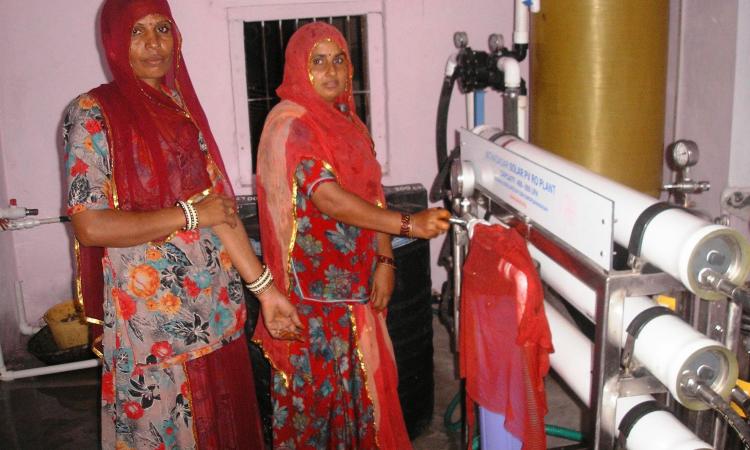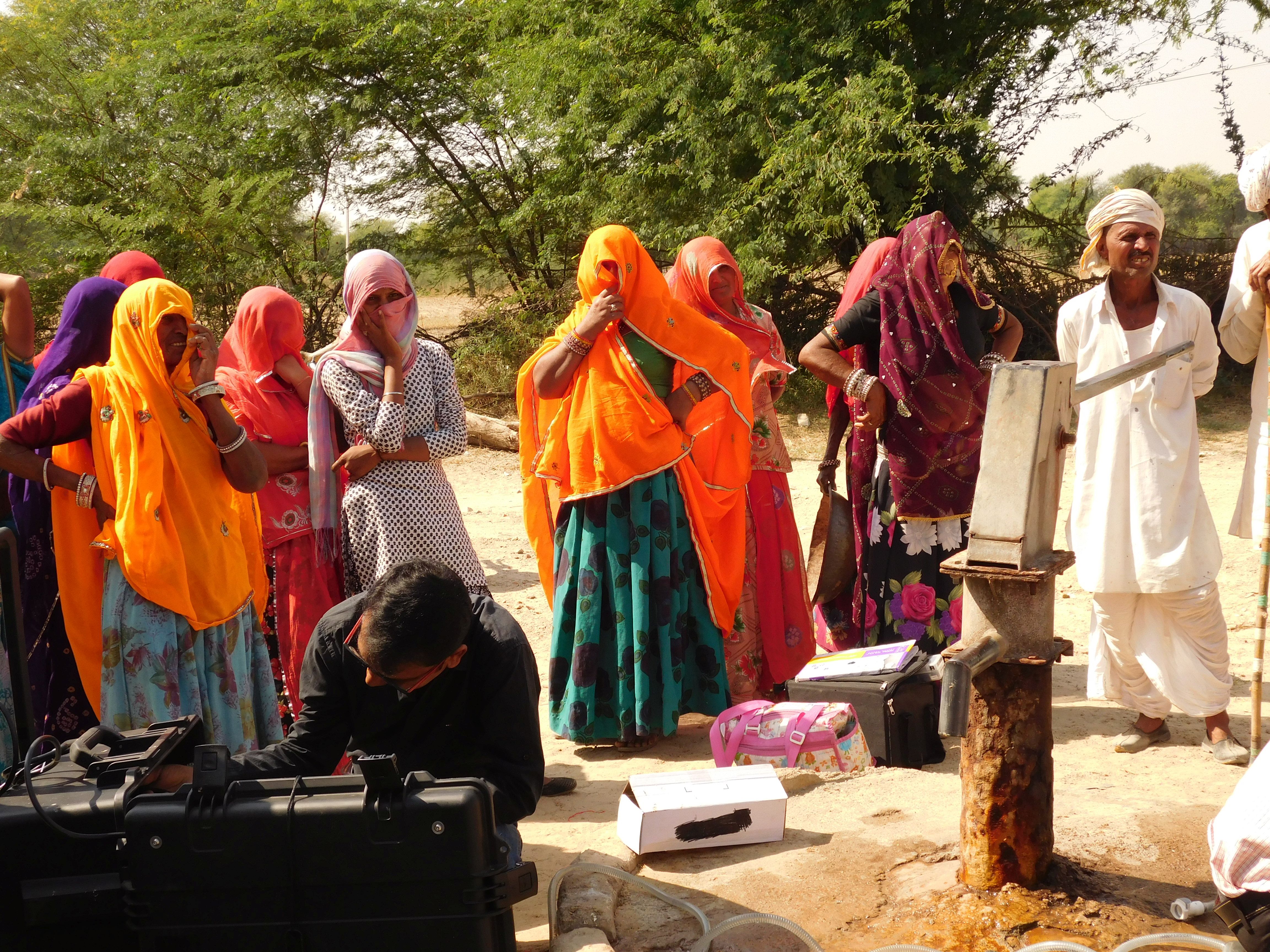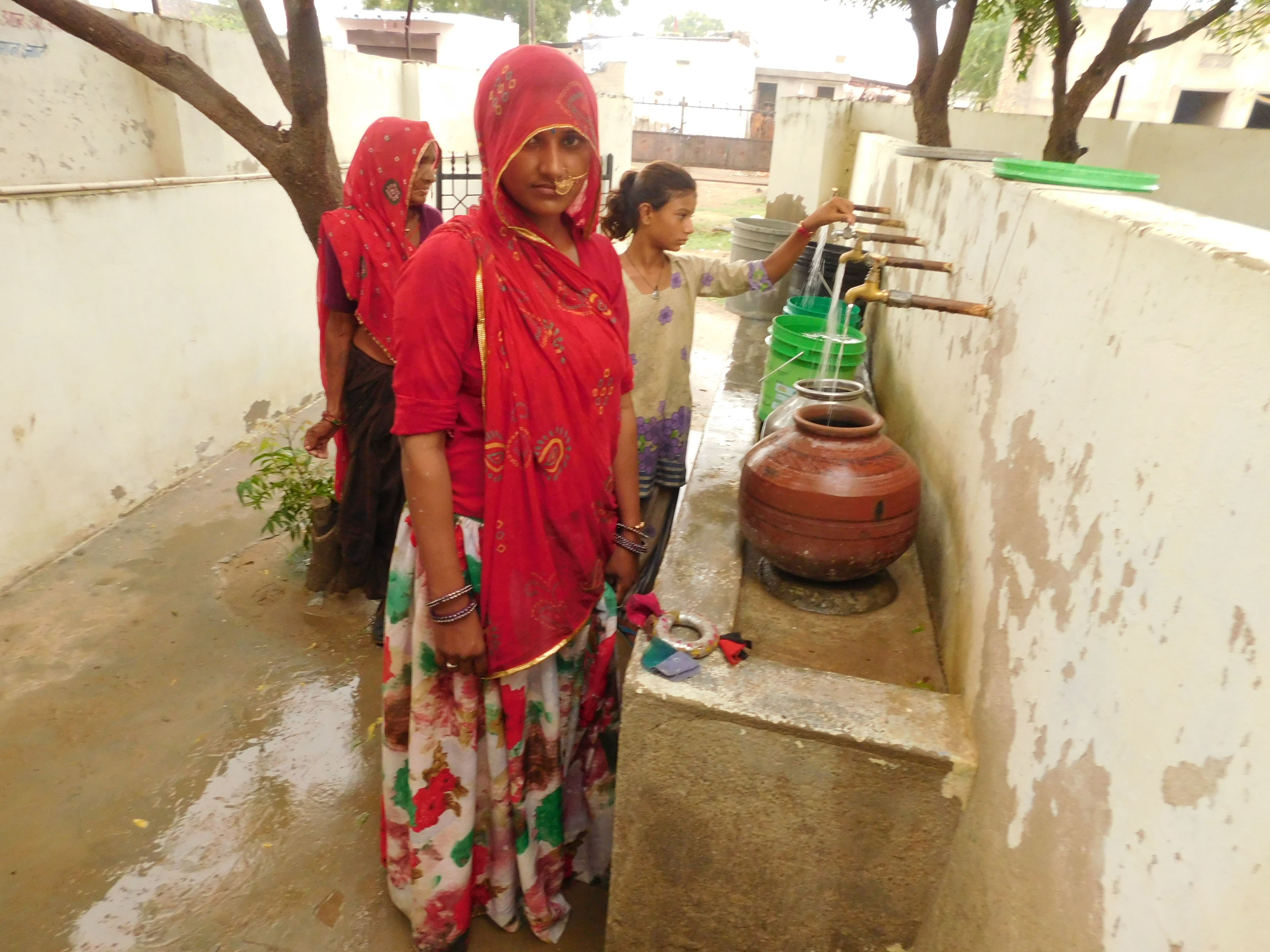
Solawata, a small village in Jaipur district is barely 10 kilometers away from Sambhar, India's largest saline lake which is a major centre of salt production that produces about two lakh tonnes of salt a year. On our way to the village from Sambhar, we see caravans packed with bright coloured camel saddles parked on the road. In sharp contrast, the villages on the way look dry and dreary with their bleak infertile lands.
Yet, Solawata rings with excitement on account of a solar workshop run by Prayatna Sansthan, a local NGO. Most of the underground water sources in the village have extremely high salt content, especially in those villages adjacent to the Sambhar lake. Solawata villagers have adopted a way to get around the problem of extra salt in water with the help from a solar-powered reverse osmosis desalination plant that provides safe drinking water to the community.
Solar lighting comes to the village

Prayatna Sansthan, an affiliated local partner NGO of Barefoot College, Tilonia has been actively working here since the 1990s on community-based sustainable solar solutions. Prayatna had long been working on the fabrication and installation of solar components that go into various solar lighting solutions like lanterns that are adopted by the villagers. The initiative is supported by Barefoot College.
Solawata, like most villages in the area, has about 20 households of Bagariyas, a poor semi-nomadic tribal community who were formerly into hunting but depend mostly on guarding other people’s fields now. Their settlements are usually outside the villages and their huts--made of scorched mud, thorny branches and plastic sheets--on stretches of desolate lands are rudimentary. Most are landless and eke out a living as labourers or from charcoal making. Being far away from the village and living on its fringes, the power grid had completely bypassed the Bagariyas, leaving them without electricity.
Laxmi Narayan who works with Prayatna Sansthan says, “This local-level initiative has gone a long way in mainstreaming the Bagariyas who are generally left out in the planning and implementation of development schemes.” “Thanks to the support from Prayatna, most Bagariya houses now have their own solar-based home lighting solutions bringing about a major change in their lives,” says Bhanwari Devi, a woman from Solawata.
Sweetwater follows
“There are thousands of salt pans in Sambhar from where enormous groundwater extraction is being done for the large-scale production of salt by the mushrooming salt industry. As a result, the village wells have dried up and groundwater levels have depleted in the area. Salts from deeper layers easily leach into the adjacent soil and water. This has rendered over 90 percent of all water resources unfit for drinking in the villages within a range of 40 km from Sambhar. The villagers approached us to ensure access to clean drinking water to all households,” says Dhanraj Sharma, secretary, Prayatna Sansthan.
 “Women and children used to trek to fetch sweetwater from a source 3 km away. Water from this beri or water body was our only source of drinking water. When that water dried up during summer, we had to rely on private tankers for drinking water which too was unreliable,” says Santosh Sharma, a woman from Solawata. “This meant a lot of drudgery for women. Many a time we were forced to depend on highly saline groundwater with total dissolved solids of up to 6000 parts per million,” says Asha Chowdhary, a college student of Solawata.
“Women and children used to trek to fetch sweetwater from a source 3 km away. Water from this beri or water body was our only source of drinking water. When that water dried up during summer, we had to rely on private tankers for drinking water which too was unreliable,” says Santosh Sharma, a woman from Solawata. “This meant a lot of drudgery for women. Many a time we were forced to depend on highly saline groundwater with total dissolved solids of up to 6000 parts per million,” says Asha Chowdhary, a college student of Solawata.
Prayatna, which had been active in Dudhu block, Jaipur got support from Coca-Cola India Foundation-Anandana for installing reverse osmosis unit in Solawata. The plant, which uses membrane distillation technology, was designed by the Central Salt and Marine Chemicals Research Institute (CSMRI), Bhavnagar. Set up in July 2012, the plant uses three membranes for distillation. The CSMRI has trained the locals to operate and maintain the solar-based system with a 5000-litre-per-day capacity.
The plant cost around Rs 35 lakh in 2012 and it has been running successfully for the last five years barring a brief period of four months this year. Barefoot College and Prayatna Sansthan have now opted for vendors at Jaipur instead of the original manufacturer at Pune to support the complex repair and replacements related to the plant. The cost of the day-to-day operation is borne by the community. The capital cost is a tad higher but the running costs are very less as the plant runs on solar power.
Need for off-grid sustainable systems
A problem with conventional desalination plants is that though they provide potable water, a major chunk of the cost of operating the water distillation plant comes from the energy utilised. The solar-powered system at Solawata uses energy from sunlight to turn salt water into potable water. This provides respite from huge operation costs for the energy used.
The installation of the plant came as a breather to the people here as the village did not have a single source of sweetwater. The plant housed within the premises of Prayatna’s office-cum-solar workshop is conveniently located and is run daily for two hours in the afternoon from 12 pm to 2 pm. It caters to the potable drinking water needs of over 65 households.
As Sharma recounts, “We used to face drinking water crisis earlier as the water was far too salty for human consumption. But now with the help of solar energy, water is easily available via motor and is stored in a big tank. Now, we just have to open the taps over here to fill water in vessels and bottles. I am glad that we got support for this as drinking harmful brackish water was taking a toll on our health.”
“Because the units are solar powered, the system is more reliable as the state’s power supply to the village is erratic. The energy source works even during cloudy seasons. We have set up pani samitis at the village level to formulate norms and procedures around the shared usage of water. Each household pays Rs 50 a month as user charges to cover the operation and repair costs. With this money, the pani samiti purchases materials necessary for the maintenance of the system and pay the mason,” says Hanuman Jat who works with Prayatna Sansthan.
There is strict rationing of water and each household gets water as per its needs. The pani samiti does surprise checks to find out if households are wasting potable water. The wastewater from the plant is used by the households for other domestic purposes like washing clothes and bathing. The idea is to make pure water available every single day for drinking and recycle wastewater.
“Solar-based desalination could be a game changer for remote locations like Solawata which are off the water-energy grid. This way, communities that lack clean drinking water can get it with minimum energy footprint and in a decentralised manner. The state needs to invest in these systems to spur renewable energy technologies," says Sharma.
/articles/salt-and-sweet-when-sun-turned-saline-water-potable